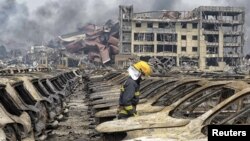A plan in Tianjin, China, to turn the site of last month's deadly warehouse explosions into an “eco-park” is drawing ridicule from local residents and online commentators.
Tianjin authorities asked for public opinion on the plan for a 24-hectare park that will include a monument to remember the dead, as well as a primary school and kindergarten nearby.
The proposal, which comes just a few weeks after the blasts, has generated critical comments online from people who question turning one of China's most notorious chemical disaster zones into a recreation area and school zone.
Opposition rises
“A primary school? And a kindergarten? Why not listen to the public opinion and relocate the city hall there,” wrote a use of social media site Weibo. Another used even harsher words, “Want to cover up the truth? We demand the immediate release of investigation findings.”
Many more expressed their dissatisfaction over the authorities’ handling of the devastation, saying they prefer to know who should be held responsible and what concrete measures will be implemented to ensure no such tragedies occur again.
Yang Xiaojun, a professor with the Chinese Academy of Governance, disagreed with the public resentment.
Yang said no deadline should be given to the investigation team, which needs to carefully comb through evidence as the cause of the blasts that killed 161 people was complex.
“From an emotional point of view, many people may find it easy to accept if those responsible are already held accountable before the reconstruction of the blast site is discussed. But these are two separate matters,” he said.
Local authorities praised
Yang praised local authorities, who he said have done a pretty good job in managing the crisis, including the criminal arrest of 11 officials. He expected the central government to follow through on its pledge to get to the bottom of what happened.
“A harsher stance may be taken [by the central government] against the further pursue of administrative accountability. For now, in terms of holding those responsible, I think, the arrest of eleven officials should have at least helped appease public concerns,” he added.
The authorities also had detained 12 employees of Ruihai International, which owns the warehouse that exploded, along with civilians who were said to have spread rumors about the disaster and its death toll online.
Political disputes
While the public continues to wait for an official explanation for the cause of the blasts, speculation is rife that political infighting in the highest echelons of the Chinese government may be playing a role in the delay.
In an article for the U.S. think tank Jamestown Foundation last Thursday, Willy Lam, a noted Chinese political analyst, said three Chinese sources with the rank of head of government departments revealed to him the top leader had convened an emergency meeting with his closest aides right after the explosions to see if there was any political motivation behind the disaster.
Back then, China's President Xi Jinping suspected the blasts were a “political conspiracy” aimed at dealing a blow to his administration, or at least making him “lose face” in the run-up to the military parade on September 3.
Lam described it as the equivalent of a “coronation ceremony” to endorse Xi’s power.
According to Lam, Xi’s suspicion, in particular, focused on dozens of senior PLA officers who are the protégés and underlings of two purged Politburo members – the late General Xu Caihou and General Guo Boxiong – although no conclusive evidence has been found.
“It’s possible that the explosions were linked with these large numbers of officials or officers in the PLA, in the party, who are not very happy with Xi Jinping, particularly, with his anti-corruption campaign [and] with his over-concentration of power,” said Lam.
Conspiracy
Other political analysts remain unconvinced of a conspiracy.
“Shall it prove to be true, I think those who premeditated and plotted the blasts at the cost of innocent human lives would just be too cruelly inhuman,” said Zhang Ming, a professor of political science at Renmin University of China.
Despite the high-profile nature of the explosions, and detentions of company executives and local officials, authorities have given no explanation for what caused the massive warehouse fire that preceded the late-night blasts on August 12.




